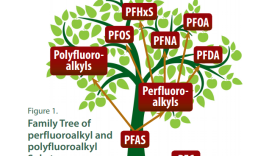Several Democratic U.S. House representatives are calling on their colleagues to pass a bill Friday concerning PFAS chemicals. It’s a bill that President Trump’s senior advisors will recommend he veto.
Flint, Michigan Congressman Dan Kildee represents communities that surround the shuttered Wurtsmith Air Force Base.
“In the richest county in the world, no family should worry that their water is contaminated with PFAS and is not safe,” Kildee says.
He says the area is affected by PFAS chemicals that have leached into drinking water and nearby lakes.
“The PFAS Action Act will protect families from PFAS in their drinking water, in their lakes, rivers and streams, and in the air, by requiring PFAS to be listed under the Safe Drinking Water Act, the Clean Water Act and the Clean Air Act,” says Kildee. “It will also require polluters and corporations to clean up their PFAS contamination through CERCLA, also known as the Superfund law.”
Kildee, one of seven representatives who held a conference call with reporters today, says his bipartisan PFAS Congressional Task Force has grown from 14 members since its creation a year ago, to more than 50. He says public awareness has also grown in a year’s time, awareness he hopes convinces Senate Republicans to pass the bill. The PFAS Action Act would require the Environmental Protection Agency to designate all perfluoroalkyl and polyfluoroalkyl substances as hazardous substances within one year of enactment of the legislation.
“The EPA and the Defense Department both have authority to protect the public from PFAS and have so far failed in their responsibility to address this public health crisis,” Kildee says. “The EPA has run an aggressive public relations campaign to convince us that they care about PFAS, but they have not acted to regulate these chemicals, even missing their own deadlines for action. And now again, just this week, the White House has signaled it would likely veto this legislation, which is shameful.”
An EPA spokesman referred a request for comment to the statement of Administration Policy issued January 7 that contains the intent to veto. The statement says the PFAS Action Act would require the Administration to bypass well-established processes, procedures and legal requirements of the nation’s most fundamental environmental laws. The statement also says the bill would create considerable litigation risk, set problematic and unreasonable rulemaking timelines and precedents, and impose substantial, unwarranted costs on federal, state and local agencies and other key stakeholders in both the public and private sectors.
New York Congressman Sean Patrick Maloney represents the 18th District, home to Stewart Air National Guard Base, and Newburgh, where PFOS contamination was uncovered in May 2016, stemming from the historic use of firefighting foam at the base. Kildee joined Maloney in Newburgh that June to tour PFOS-contaminated Washington Lake, a drinking water source for the city that hasn’t been used since. Maloney authored a measure included in the PFAS Action Act:
“Require the testing of per- and poly-fluoroalkyl substances by any person who manufactures or possesses PFAS chemicals. And it will require that that testing be sent to the EPA, and it will require the EPA to set testing requirements and also to make those results public. So that’s the PFAS Testing Act of 2019, H.R. 2608, which is incorporated, along with about 10 other bills in this important piece of legislation,” Maloney says. “And it’s just one more piece of this puzzle to make sure that we’re getting the best information on these substances, the best research done, effective testing of the substances and of public disclosure. We want the public to know the facts.”
New York 19th District Congressman Antonio Delgado is one of the PFAS Action Act’s 66 co-sponsors. Delgado, who introduced the PFAS Transparency Act on January 3, was planning to offer it as an amendment late Thursday to the PFAS Action Act. His measure would prohibit indirect discharges of industrial PFAS into wastewater treatment systems unless the treatment plant operator is given advance notice.
Michigan Congresswoman Debbie Dingell is the main sponsor of the PFAS Action Act. She says the bill is a start by designating just PFOA and PFOS as hazardous chemicals from the PFAS family of chemicals, with the hope that the legislation would have a better chance of making it into law. She believes the bill will pass the House when voted upon Friday, but faces challenges in the Republican-led Senate. Congressman Harley Rouda:
“Just in my state alone, in California, in the recent testing of the water districts in California, 40 percent of them showed levels of PFAS contamination above the suggested EPA threshold,” Rouda says.
The EPA’s current health advisory for PFOA and PFOS in drinking water is 70 parts per trillion. The latest National Defense Authorization Act included some provisions that would address PFAS water contamination, but left out others.








